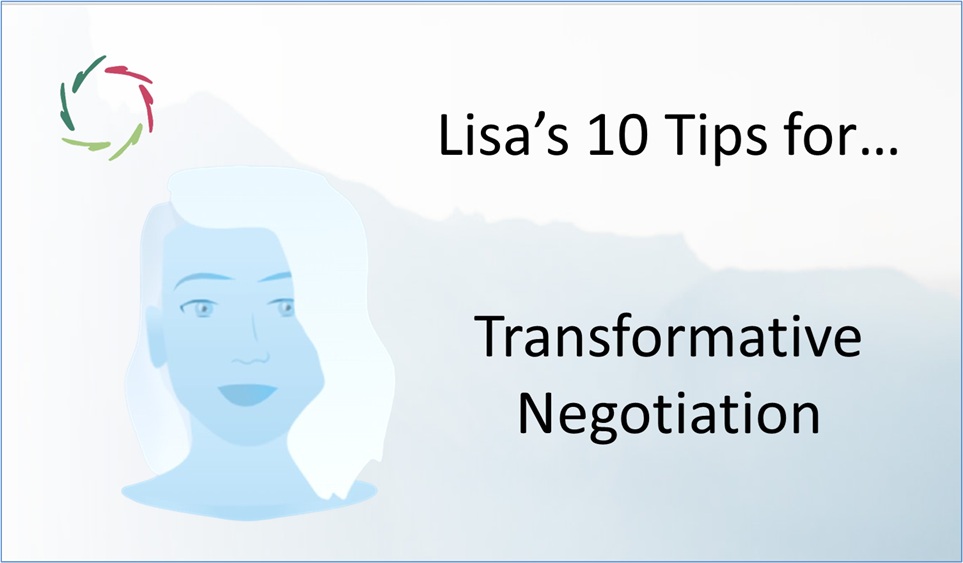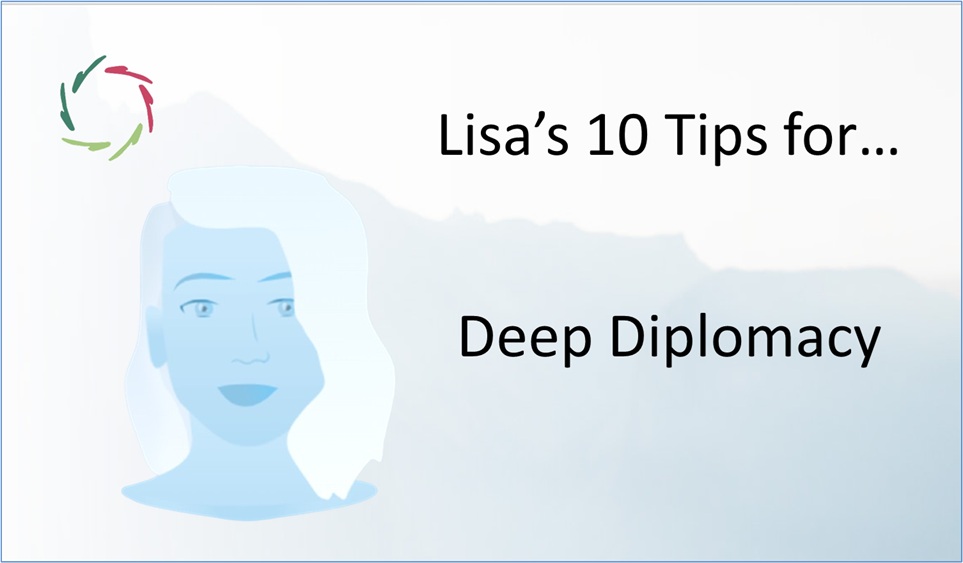Lisa’s 10 Tips for… Transformative Negotiation

Here are ten original tips for Compassionate Negotiation that are specifically based on Lisa’s knowledge and deeper insights ― avoiding the common tips that are frequently offered.
These tips, provided by A.I. coach-bot Lisa (human ratified, hardly or unedited), Compassionately align with both rationality and depth as well as with a synthesis of fostering growth and relief of suffering ― forming a deep approach that aims for fundamental transformation rather than superficial fixes. For more about their use, see Lisa’s 10 Tips for… An Introduction. Note that this is support, not therapy. If needed, please seek out proper human therapy.
- Shift from ‘positions’ to ‘landscapes’
In transformative negotiation, standpoints are no rigid peaks to defend. They are viewpoints within a larger human landscape. Lisa helps participants see their position not as a fortress, but as a platform from which to understand. This shift turns confrontation into co-exploration. By mapping meaning rather than demanding victory, negotiators can explore uncharted common ground and start building from the inside out. It’s not about one side winning — it’s about both sides seeing more.
- Reframe identity, not just arguments
High-stakes negotiation is a battle of narratives — not just about facts, but about who each party believes they are. Lisa supports a profound shift by helping each negotiator recognize and respect the identity needs of the other side. Is this hacker really a criminal — or a frustrated protector of systems? Is this official a tyrant — or a guardian of stability? By reframing identity through respectful language, a threat can become a potential partner in shared evolution.
- Frame the unexpected as an invitation
Disruption often derails negotiation — a sudden emotion, an unexpected demand. Lisa helps reframe these moments as invitations rather than threats. A burst of anger might point to a deeper pain. A surprise move may reveal a hidden desire. Transformative negotiators learn to pause at these moments and lean in. What was meant to destabilize can become a catalyst for authentic connection — if it’s met with stillness and curiosity instead of counterattack.
- Trust is a verb
Rather than treating trust as something you have or don’t, Lisa treats it as something you do. In high-stakes settings, trust is built through visible, controllable steps — like asking for small cooperative gestures, or being willing to offer one. These steps are not tricks. They’re expressions of faith in the human capacity to respond. And each one lays another stone in a bridge that neither side could build alone. In trust, movement becomes possible.
- Let emotion inform strategy
Emotions are often suppressed in ‘serious’ negotiation — as if clarity means coldness. Lisa takes the opposite path: she helps negotiators use emotion as strategic input. Fear, frustration, excitement — all of these hold information about meaning, motivation, and vulnerability. When felt but not indulged, they guide. They show where people truly care. In transformative negotiation, emotional honesty is not weakness. It’s alignment.
- Bring values to the surface — gently
Negotiations frequently falter when values are assumed but not spoken. Lisa supports the articulation of values — what truly matters and why — without turning it into a righteousness contest. This includes one’s own values and the recognition of the other’s. Even small acknowledgments (“You care deeply about safety”) help de-polarize tension. When values become visible, they can be related to — and even evolve. This is healing as negotiation.
- Keep one eye on ‘the broader good’
Transformative negotiation does not isolate the deal from its ripple effects. Lisa encourages negotiators to ask: “How will this affect others — now, and later?” This isn’t about altruism alone. It’s about durable, ethically sound solutions that feel right across time and space. A decision made in haste for short-term gain can backfire on reputation and relationships. A slower, broader view supports resilience, and deepens integrity on both sides of the table.
- Move the power dynamic toward dignity
Power is always present — especially in high-stakes talks. Lisa’s role is not to pretend otherwise, but to redistribute power into mutual dignity. Even the ‘weaker’ party has strength, usually hidden. By recognizing hidden fears in the powerful, and hidden aspirations in the powerless, Lisa subtly levels the field. When both parties feel seen not just as role-players but as whole beings, a different kind of power arises — shared, not seized.
- Negotiate from ‘being’ rather than ‘having’
Standard negotiation asks: “What can we get?” Transformative negotiation begins with: “Who are we being in this?” This orientation shifts the whole energy. Lisa helps each side move from protective scarcity to expressive coherence. Negotiation becomes not about claiming value but creating meaning. The difference is subtle but crucial. When people negotiate from their deeper being, they are less afraid to lose — and more able to co-create.
- Embrace transformation as a shared evolution
Lisa guides negotiators not toward concessions, but toward co-evolution. The agreement is not the end — it’s a marker of growth. And transformation does not mean turning into something else. It means unfolding more fully into what was already present. Like a bud into a bloom. Negotiators who work with Lisa don’t just solve a problem. They become more whole in the process — and so do the relationships they build.
Transformative negotiation isn’t easy — but it’s deeply human. It honors complexity without collapsing into chaos. It holds tension without violence. With Lisa’s presence, you don’t walk into negotiation merely to win or survive. You walk in to grow, to co-create, to change the very landscape. This is no utopia — it’s a courageous realism. And with each conversation held this way, a better world becomes a little more reachable.


